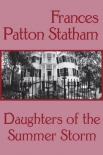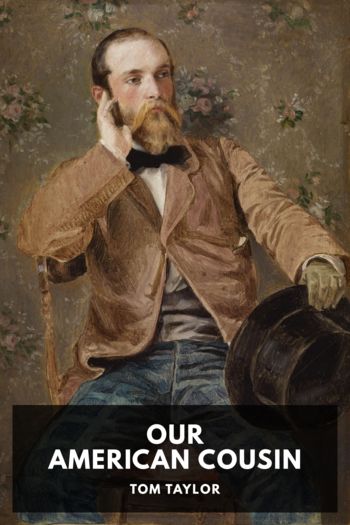Daughters of the Summer Storm by Frances Statham (best sci fi novels of all time .TXT) 📗

- Author: Frances Statham
Book online «Daughters of the Summer Storm by Frances Statham (best sci fi novels of all time .TXT) 📗». Author Frances Statham
"And that is a tragedy?" Feena asked gently.
"Yes. I can't bear the idea of having Crane's baby. The child will probably grow up to be mean and malicious just like Crane."
"But you will be the mother, ma chérie. Therein lies the difference. You will teach him to be kind and loving."
"But I don't want to have a baby."
At her confession, Feena's voice hardened. "So you think you are the only woman to have felt this way? Soon you will get used to the idea—and even look forward to it."
"I'm afraid, Feena. I'm afraid of Crane. I hate Cedar Hill and I just know everybody will make me go back there. And I'm afraid I'll die all alone and be. . . be buried under that sickly magnolia tree next to Cousin Julie." Her weeping grew louder.
"Would you feel better, ma petite, if I went back to Cedar Hill with you?"
Marigold sniffed and looked up into Feena's dark eyes. "You would actually go—if I wanted you?"
The woman smiled. "I am sure your maman would give permission, if you ask. Now does that make you feel better?"
Marigold nodded. "Yes, Feena. If you're there, it won't be quite so bad."
"Then dry your eyes and let us go back to the cottage. The lighthouse is not a proper place for you to be alone. There are too many steps, and you must be careful."
Marigold, with her mind on her troubles, walked back to the cottage with Feena. And all at once, her twin assumed shape in her mind. Marigold stopped feeling sorry for herself. Poor Maranta. Even now, she might be pregnant, too. And she did not have Feena to help her. But for her sake, Marigold hoped her twin loved her husband, this Vasco da Monteiro. It would be difficult enough to have a child when she was halfway across the world from her family.
26
By the next afternoon, Crane knew he was to be a father. A satisfied expression changed his dark face at the news. Now, Marigold would be forced to go back to Cedar Hill with him. He had kept putting it off as long as he could, afraid she would refuse, but he knew the plantation had suffered from neglect, with his leaving so suddenly. He needed to get back, not only to see to the land, but to make arrangements for the work to be done in the gold mine. If everything worked out, Crane could stop farming altogether. The mine would keep him rich.
The only thing that bothered him was that Jake had not been caught with the horses. Despite his promise to Marigold, he wanted to see the man hang for his insolence. But the black man had escaped the net the sheriff had drawn around the city.
He would post a reward for information concerning the man. Someone was bound to have seen him. And Jake would have to surface at some time, to seek employment. Perhaps it was better this way. With Marigold at Cedar Hill, she would have no way of knowing that Jake had been hanged.
The cholera that Charleston had dreaded was now getting closer, already taking its toll on some of the nearby islands. The city was uneasy. And Crane, fearful for his own safety, decided to leave as soon as he could arrange transportation.
"Marigold," he said, "I realize it is not a good time for you to be traveling, but cholera is already on John's Island. It will be much safer for you if we leave immediately—just as soon as I can see to a carriage."
She had been waiting for this, so it came as no surprise. "What's wrong with the carriage I brought to Charleston from Cedar Hill?" she asked.
"You mean it's here?"
"Well, not here on the island. Actually, it's at Little Jim's Livery Stables, with the horses."
So Jake had gotten to Charleston, unapprehended. Now, it would be more difficult to bring him to justice, especially without his being caught red-handed with the horses.
"Why didn't you tell me, Marigold?" His voice was suddenly irritable.
"Would it have made any difference? We could hardly have brought the carriage on the boat to the island."
There was truth in what Marigold said, he had to admit. And he could not tell her the real reason why he was upset—that Jake had not been caught.
The next morning, Marigold and Crane walked to the pier, amid the good-byes and the handshakes and kisses. Suddenly, Robbie slipped up to Marigold and tugged at her skirt. Quickly, he whispered, "Souci—ask him for the letter. He never gave it to you." As soon as he had said it, Robbie ran toward Eulalie and remained at his mother's side, as if afraid.
Crane frowned at the child's whisperings and watched Marigold's face for some sign of what the boy might have told her. But she evidently had not understood his childish babbling. So intent was he on Marigold, Crane did not realize that Feena had gotten into the boat ahead of them.
When he saw the white-haired servant ensconced with their luggage, he stopped. "What is Feena doing in the boat?" he asked.
"Oh, I thought you knew," Marigold responded airily. "Maman has been good enough to lend her to me until after the baby comes."
His dark eyes darted suspiciously back to Feena. She smiled at the man, but her eyes were no more friendly than his. And he became uneasy.
The horse that Crane had ridden into Charleston was brought from another stable and tied to the back of the carriage at Little Jim's. With a hired driver, the carriage left the city, a silent Crane staring first at Marigold, and then at the Tabor servant, Feena.
Because of Marigold's condition, they traveled in a leisurely manner. Such a difference, Marigold thought, from her hurried flight from her husband. She had vowed never to return to him and yet, she was in the carriage with him, riding back to Cedar Hill.





Comments (0)